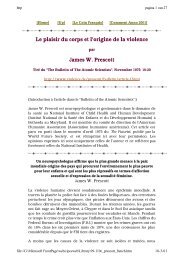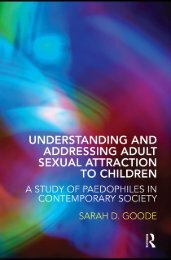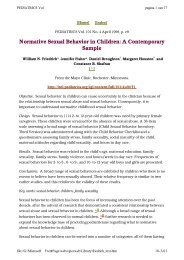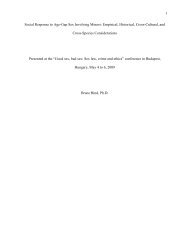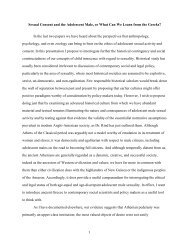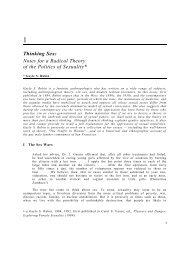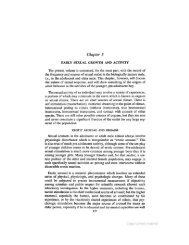Infant and Child Sexuality: A Sociological Perspective - Ipce
Infant and Child Sexuality: A Sociological Perspective - Ipce
Infant and Child Sexuality: A Sociological Perspective - Ipce
Create successful ePaper yourself
Turn your PDF publications into a flip-book with our unique Google optimized e-Paper software.
her mother didn’t know what to do <strong>and</strong> then<br />
decided to go along as long as her daughter<br />
seemed okay. She put her h<strong>and</strong> on her daughter’s<br />
genitals <strong>and</strong> suggested Alice put hers on top,<br />
showing her mother how it felt best. Her daughter<br />
started moving rhythmically <strong>and</strong> breathing<br />
heavily, exactly as she had seen her mother do.<br />
Her motion <strong>and</strong> breathing gradually built up to a<br />
climax <strong>and</strong> she relaxed. Whether she actually<br />
reached orgasm or mimicked it is uncertain. She<br />
was happy <strong>and</strong> thanked her mother. (Constantine).<br />
Barb, at five, appeared to be completely comfortable<br />
being present when her parents made love.<br />
Her parents were casual about sensual interactions<br />
with their children. One day Barb asked,<br />
“Dad, can I have a ‘love-in’ with you?” “Well,<br />
maybe when you’re older, if you still want to we<br />
can talk about it.” It was an honest reply, not a<br />
put-off, <strong>and</strong> satisfied her. She continued to have<br />
interest in erotic involvement with her father<br />
with no apparent anxieties on the part of either<br />
daughter or father. (Constantine).<br />
The child’s first ideas about marriage are based upon what he observes<br />
of his parents’ behavior <strong>and</strong> on the encounters he has with his<br />
parents. He is aware that emotion <strong>and</strong> affection are or are not displayed,<br />
that sharing does or does not take place, that thoughtfulness<br />
<strong>and</strong> concern are or are not shown. Later on, he seeks to emulate or reject<br />
their patterns of behavior. Most parents have something of a life<br />
together of which the child is not a part. The child does not always<br />
accept the fact that he is an outsider to some parental activity <strong>and</strong><br />
may have difficulty adjusting to it. In the following case, the secrecy<br />
that the child felt cloaked his parents’ separation from him<br />
added to his feeling of alienation.<br />
I believe I was aware of it when I was about<br />
five or six years old. That is when I became<br />
aware of the fact my mother <strong>and</strong> father were<br />
going out sometimes at night after I was supposed<br />
to be asleep. My room was near the garage,<br />
<strong>and</strong> the opening garage door made quite a racket.<br />
It would awaken me, <strong>and</strong> I often would lie awake<br />
until they returned late at night. I figured<br />
that they were trying to keep this secret from<br />
me by sneaking out while I was asleep. This made<br />
me think they felt a little guilty about it, <strong>and</strong><br />
so I never brought it up, although I often cried<br />
for hours while they were gone because the situation<br />
disturbed me so.<br />
Many parents who “go out” do not hide this fact from their children<br />
but provide a surrogate parent in the person of a baby-sitter. On<br />
the other h<strong>and</strong>, most children do not learn much about sexual behavior<br />
even from parents who accept their own sexual activity <strong>and</strong> enjoy it because<br />
of the parents’ desire for privacy, their ingenuity, <strong>and</strong> their<br />
felt ‘need’ to keep sexuality secret from the child. (Gagnon, August<br />
53



